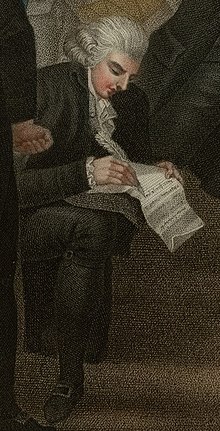Jacques Roux
Jacques Roux (* 21st August 1752 in Pranzac (now the Charente in the region Nouvelle-Aquitaine ); † 10. February 1794 in Bicêtre ) was a French priest and revolutionary .
Life
When the French Revolution broke out in 1789, Roux was a priest in Saint-Thomas-de-Conac near the Atlantic coast. Because he had welcomed the revolution and tried to fire it up in his sermons, he had to leave his congregation because of his radicalism and went to Paris. Here he enthusiastically swore the oath on the civil constitution of the clergy and from then on worked as a pastor of the Gravilliers section.
After the king's flight , Roux turned into a vehement republican; he stood up for the execution of Louis XVI. one that he called "Ludwig the Last". He also took in Jean Paul Marat when he had to go into hiding in 1792. Roux had earned the reputation of a "little Marat" in his section. He supervised Ludwig, now known as "Citizen Capet", as a representative of the revolutionary Paris Commune, in whose General Council he had been elected, on the way to the guillotine .
After the king's execution, however, there were signs of conflict within the political left. Although Roux was a member of the Jacobins and the Cordeliers , in 1793 he represented more radical positions than most revolutionaries on many issues. That is why he and other, like-minded revolutionaries were referred to as enragés , "ultra -revolutionaries " overshooting the mark.
During the uprisings in late May and early June 1793 , the Enragés, the Hébertists and the Jacobins around Maximilien de Robespierre still worked together against the Girondists , although differences were already apparent. But thereafter Roux continued to criticize the policy of the National Convention by calling for stricter action against - i.e. more executions of - speculators and hoarders, whom he particularly blamed for the difficult supply situation for the Parisian population and the sans-culottes . In this way, Roux wanted to come closer to real social equality. For this, however, he received harsh criticism from the Convention, from Marat, the Jacobins and the Hébertists.
After Marat was murdered in July, Roux continued his newspaper "Le Publiciste de la République française" as "Shadow Marat" despite their recent arguments. Robespierre, however, had Marat's partner Simone Evrard speak against Roux in the convent and with the Jacobins in order to discredit him, and Hébert presented himself as the only worthy successor of Marat.
After the September Movement on September 5, 1793, Roux found himself with the Jacobins and was arrested by them. When after a long prison sentence was finally foreseeable that he the revolutionary tribunal would be transferred and probably sentenced to death, Roux committed in 1794 on 10 February suicide .
reception
Karl Marx mentions Roux in The Holy Family as a forerunner of communism , although Roux cannot be called a communist because he was not in favor of the abolition of private property. In researching the Enragés, the GDR historian Walter Markov stood out in particular . Peter Weiss lets Roux appear as a character in his play The Persecution and Murder of Jean Paul Marat, portrayed by the acting group of the Charenton Hospice under the guidance of Mr de Sade .
Works
- Walter Markov (Ed.): Jacques Roux: Scripta et Acta, Berlin 1969.
- Walter Markov (Ed.): Jacques Roux: Freedom will conquer the world. Speeches and writings, Frankfurt a. M. 1985.
literature
- Walter Markov: The Freedoms of the Priest Roux, Berlin 1967.
- Robert Rose: The Enragés. Socialists of the French Revolution ?, Canberra 1965.
- Heinrich Scheel (ed.): A jury for Jacques Roux. Dedicated to the work of Walter Markov (meeting reports of the Academy of Sciences of the GDR 1), Berlin 1981.
- Morris Slavin: Jacques Roux: A Victim of Villification, in: French Historical Studies Jg. 1964, pp. 525-537.
Individual evidence
- ↑ See Morris Slavin: Jacques Roux: A Victim of Villification, in: French Historical Studies, Jg. 1964, pp. 525-537; Rose, pp. 36-48.
- ↑ See Morris Slavin: The Making of an Insurrection. Parisian Sections and the Gironde, Cambridge 1986, pp. 127-141.
- ↑ The best-known testimony to this is the so-called "Manifesto of the Enragés", read in: Walter Grab (Ed.): The French Revolution. A documentation. 68 source texts and a time table, Munich 1973, pp. 163–171.
- ^ Edited by Walter Markov in: Jacques Roux: Scripta et Acta and translated into: Walter Markov (Hrsg.) Jacques Roux: Freedom will conquer the world.
- ↑ Karl Marx, Friedrich Engels: The Holy Family or Critique of Critical Criticism. Against Bruno Bauer & Consorten, in: MEW, Vol. 2, p. 126.
- ↑ See Rose, Chapter: The Enragés as Socialists.
Web links
| personal data | |
|---|---|
| SURNAME | Roux, Jacques |
| BRIEF DESCRIPTION | French revolutionary |
| DATE OF BIRTH | August 21, 1752 |
| PLACE OF BIRTH | Pranzac , France |
| DATE OF DEATH | February 10, 1794 |
| Place of death | Bicêtre |
